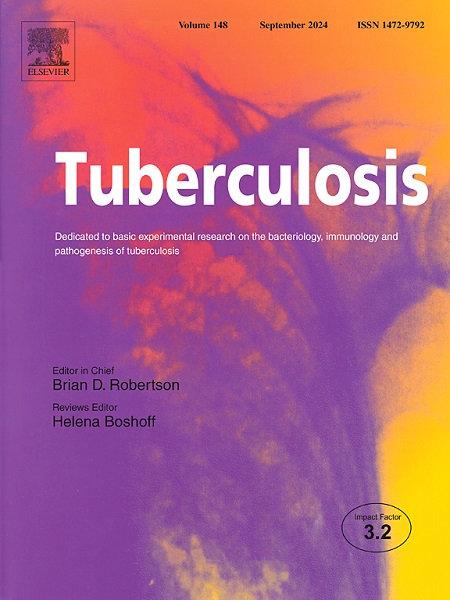High centrifugation speed improves recovery of M. tuberculosis and yield of culture
IF 2.9
3区 医学
Q3 IMMUNOLOGY
引用次数: 0
Abstract
Background
We assessed the impact of centrifugation on recovery of Mycobacterium tuberculosis (M.tb).
Methods
We used 0.5 McFarland from the 2 weeks M. tb, H37Rv culture and homogenized sputum for our experiments. Samples were decontaminated by 2 % NaOH for 20 min and with PBS for controls. Decontaminated aliquots were centrifuged at 2000×g, 3000×g and 6000×g for 40 min and inoculated on MGIT and LJ media. MGITs were incubated into the BACTEC MGIT 960 Systems following BD manuals and data analyzed on GraphPad Software.
Results
The positivity (days) for M. tb, H37Rv in MGIT and LJ decreased from 20.4 to 17.7 and from 47.6 to 26.6 at 2000×g and 6000×g, respectively; P > 0.05. For controls, MGIT and LJ positivity (days) decreased from 19 to 10 and from 39.2 to 11.2 at 2000×g and 6000×g, respectively; P > 0.05. MGIT positivity was 6(60 %) at 2000×g and 8(80 %) at 6000×g, corresponding to mean (±SD) of 13.7 ± 6.7 and 9.06 ± 4.6 days, respectively for sputum. LJ positivity was 1(10 %) at 2000×g and 7(70 %) at 6000×g. MGIT contamination for controls (sputum) was over 50 % and 80 % for LJ.
Conclusion
Higher centrifugation speed improves yield and sensitivity of TB culture.
高离心速度可提高结核分枝杆菌的回收率和培养产量
我们评估了离心对结核分枝杆菌(M.tb)回收的影响。方法采用2周结核分枝杆菌、H37Rv培养液和匀浆痰液0.5 McFarland进行实验。样品用2% NaOH净化20分钟,用PBS作为对照。净化后的等分液在2000×g、3000×g和6000×g离心40分钟,接种于MGIT和LJ培养基。根据BD手册和GraphPad软件分析的数据,将MGIT培养到BACTEC MGIT 960系统中。结果MGIT和LJ中结核分枝杆菌、H37Rv在2000×g和6000×g的阳性(d)分别由20.4和47.6降至17.7和26.6;P比;0.05. 对照中,在2000×g和6000×g, MGIT和LJ阳性(天)分别从19降至10天和从39.2降至11.2天;P比;0.05. 在2000×g和6000×g, MGIT阳性分别为6(60%)和8(80%),对应于痰液的平均(±SD)分别为13.7±6.7和9.06±4.6天。LJ阳性在2000×g为1例(10%),在6000×g为7例(70%)。对照组(痰)MGIT污染超过50%,LJ超过80%。结论较高的离心速度可提高结核杆菌培养的产率和灵敏度。
本文章由计算机程序翻译,如有差异,请以英文原文为准。
求助全文
约1分钟内获得全文
求助全文
来源期刊

Tuberculosis
医学-呼吸系统
CiteScore
4.60
自引率
3.10%
发文量
87
审稿时长
49 days
期刊介绍:
Tuberculosis is a speciality journal focusing on basic experimental research on tuberculosis, notably on bacteriological, immunological and pathogenesis aspects of the disease. The journal publishes original research and reviews on the host response and immunology of tuberculosis and the molecular biology, genetics and physiology of the organism, however discourages submissions with a meta-analytical focus (for example, articles based on searches of published articles in public electronic databases, especially where there is lack of evidence of the personal involvement of authors in the generation of such material). We do not publish Clinical Case-Studies.
Areas on which submissions are welcomed include:
-Clinical TrialsDiagnostics-
Antimicrobial resistance-
Immunology-
Leprosy-
Microbiology, including microbial physiology-
Molecular epidemiology-
Non-tuberculous Mycobacteria-
Pathogenesis-
Pathology-
Vaccine development.
This Journal does not accept case-reports.
The resurgence of interest in tuberculosis has accelerated the pace of relevant research and Tuberculosis has grown with it, as the only journal dedicated to experimental biomedical research in tuberculosis.
 求助内容:
求助内容: 应助结果提醒方式:
应助结果提醒方式:


